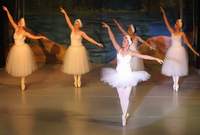USSR's political icon, Swan Lake ballet, prepares to celebrate 130 years
Russia’s Swan Lake, a worldwide known ballet, is celebrating 130 years on March 4. The Bolshoi Theater, which held the premiere of the ballet in 1877, is still closed for reconstruction. The special performance to mark the anniversary of the ballet is to take place in Moscow on March 1 in the hall of the Kremlin Palace.

This iconic spectacle of the Russian culture has always enjoyed great popularity with both Soviet and Russian politicians. President Putin is not an exception. Vladimir Lenin was the only leader who did not like Swan Lake. Lenin preferred not to listen to classical music saying that it weakened work and thinking. In addition, Lenin thought that Tchaikovsky’s music was reflecting the spirit of bourgeoisie.
Swan Lake is not only the most famous ballet per se. It is the most politicized ballet in the world, a mirror of Russian life and quality. It went through censorship, the era of czars, the October Revolution, the era of Stalin, WWII and years of setback. When the Soviet Union collapsed on August 19 1991, one of the central channels of the Soviet television was showing Swan Lake non-stop.
The Kremlin turned Swan Lake into a powerful state symbol. The Soviet leadership would always take foreign politicians to the Bolshoi to see Swan Lake during their visits to Moscow. Swan Lake was the key cultural event for all foreign delegations visiting USSR’s capital too.
Stalin realized that it was extremely important to keep Swan Lake in the repertoire of the Bolshoi Theatre during WWII years. The spectacle was staged 150 times during the war years in spite of the fact that Moscow was suffering from Nazi bombs (one of the bombs exploded near the entrance to the theatre).
The fairytale about princess Odette, who was turned into a swan by a curse of an evil sorcerer, was touching the hearts and minds of theater-goers all over the world. It did not really matter that the USSR was using the ballet for its communist propaganda. People were lining up for tickets, whereas Moscow authorities were making up with profiteers.
US Ambassador to Moscow, Llewellyn E. Thompson, saw the spectacle 132 times during seven years of his work in the USSR. Of course, the American politician was greatly interested in such dramatic events and the Cuban crisis or the story with the U-2 spy plane piloted by Francis Gary Powers. However, when Thompson needed to sound out sentiments of a Soviet politician, he preferred to communicate with him at the Bolshoi Theater, watching Swan Lake.
Nikita Khrushchev met Mao Zedong at the Bolshoi Theatre on November 15, 1957 to let the whole world know that China and the USSR were two friendly nations. The friendship between the Soviet Union and China went up in smoke later, but Swan Lake continued to symbolize peace in the world.
Cuban leader Fidel Castro was applauding the spectacle at night of March 29, 1963. Castro had no idea that John F. Kennedy would be doing the same only several days later.
Inopressa
Translated by Dmitry Sudakov
Pravda.ru
Subscribe to Pravda.Ru Telegram channel, Facebook, RSS!


